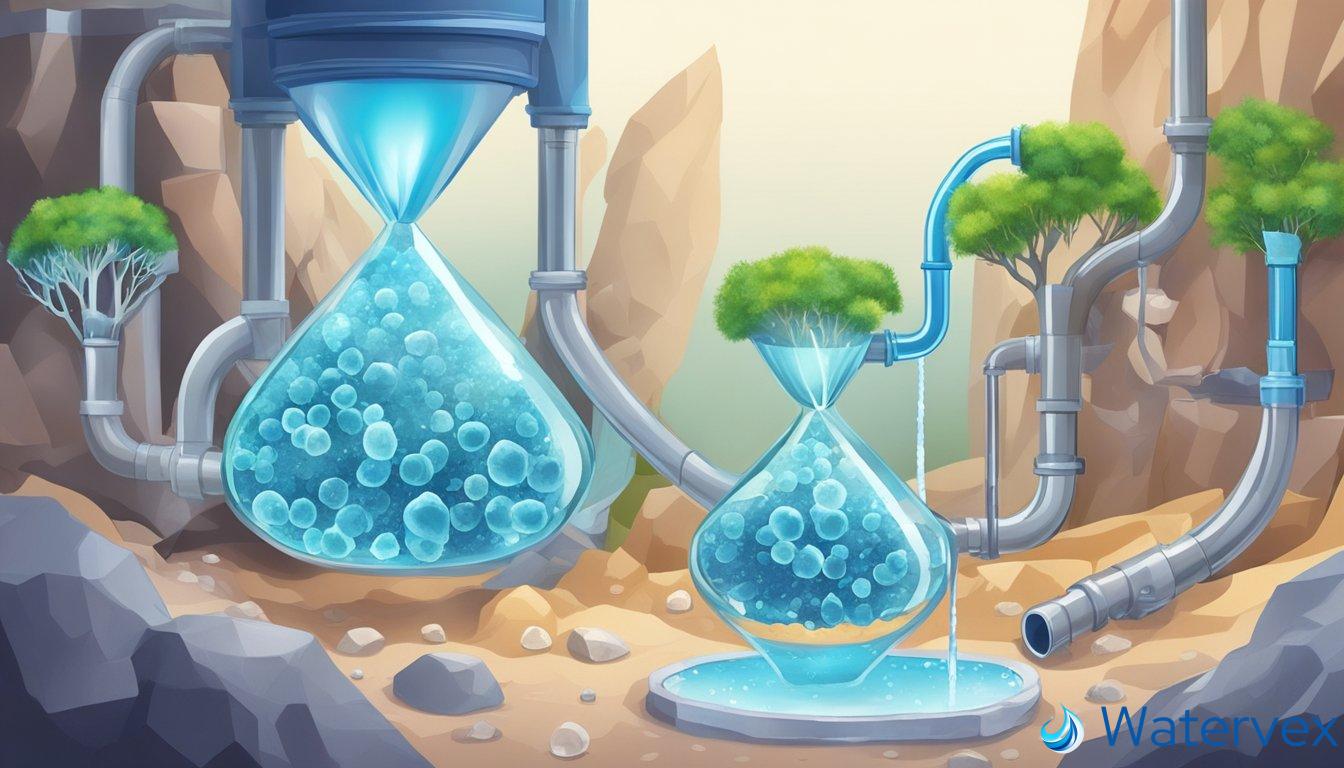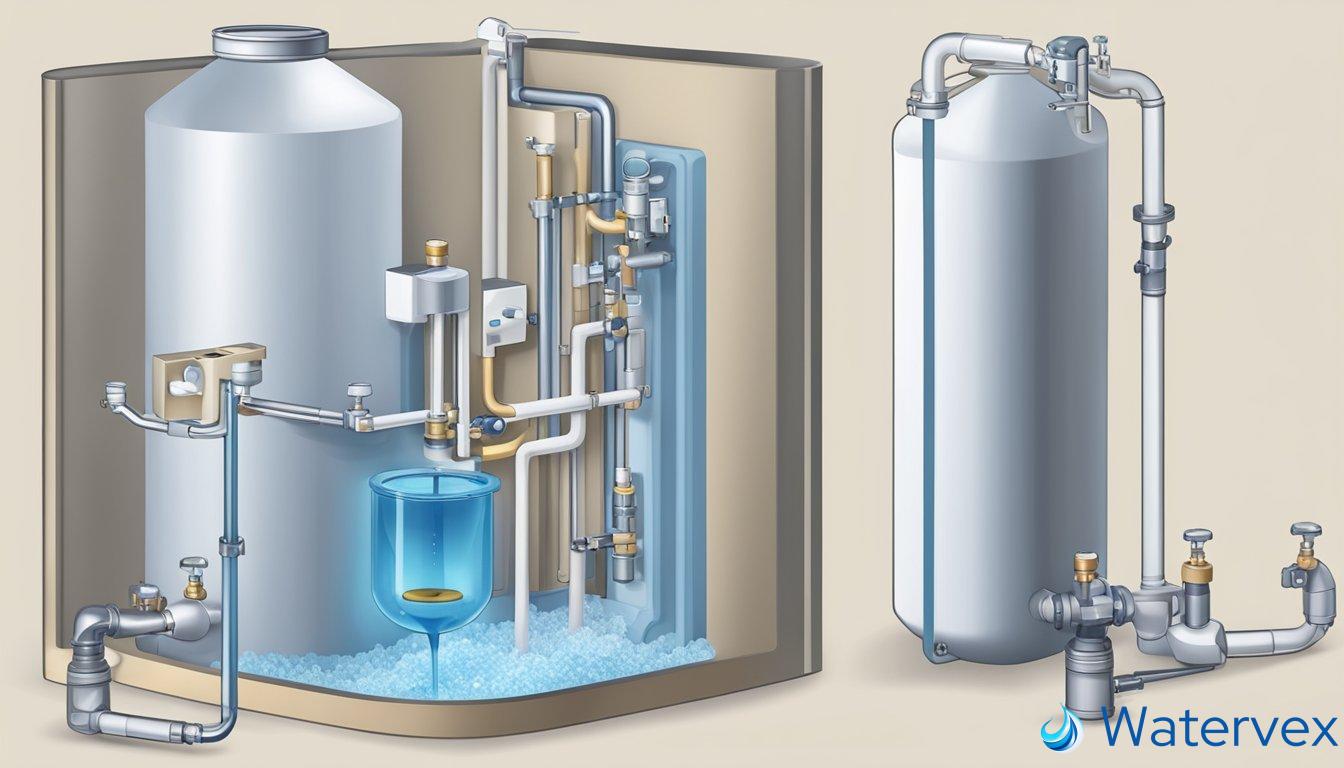When it comes to maintaining a healthy urinary tract and preventing kidney stones, the role of well-hydrated urine cannot be overstated. Kidney stones are hard mineral deposits that can form in your kidneys and can cause severe pain when passing through your urinary tract. One factor that can contribute to the formation of these stones is the mineral content of your water, particularly calcium and magnesium levels.

Using a water softener at home alters the makeup of your water by reducing the concentrations of these minerals, which could influence the likelihood of kidney stone formation. Understandably, individuals, including families and homeowners who are vigilant about water quality and its health impact, are interested in whether water softeners can be a viable preventative strategy against kidney stones. It’s essential to consider both the qualities of your drinking water and your overall hydration practices when looking to prevent the occurrence of this painful condition.
Key Takeaways
- Proper hydration is critical for preventing kidney stones.
- Water softeners can change the mineral content in drinking water.
- Prevention of kidney stones includes considering water quality and hydration.
Understanding Kidney Stones
When discussing kidney stones, it’s essential to grasp what they are—a concentration of minerals and salt, often calcium and oxalate, that can form in your kidneys. Both men and women can develop kidney stones, though men are more commonly afflicted. These stones can manifest due to a variety of risk factors like dehydration, high protein, and sodium diets, as well as conditions such as diabetes, urinary tract infections, and kidney disease.
The connection between calcium in water and stones is often misunderstood. Hard water does contain higher calcium levels, but it does not necessarily lead to stones. In fact, a balanced intake of calcium can prevent calcium oxalate stones—the most common type.
When stones move into the urinary tract, they cause notable pain and symptoms like bloody urine or a persistent urge to urinate. The stone types—calcium oxalate, calcium phosphate, uric acid, and cystine—influence their formation reasons and treatment methods. Calcium Stones are prevalent, but Uric Acid Stones can result from eating a lot of fish, shellfish, and meats. Less common are Cystine Stones, reflecting a genetic disorder, and Struvite Stones, associated with infections.
Managing food and diet plays a key role. Reducing high-oxalate foods like nuts and certain greens, and regulating fluids consumption—particularly water—can help manage stone formation. If you’re concerned about stone formation, aim to produce at least 2 to 2.5 liters of urine per day to dilute the substances in your urine; staying hydrated is your best defense.
You don’t necessarily need to fear hard water and kidney stones, but being aware of your hydration, diet, and lifestyle can help lower your risk. Including more fluids in your routine and managing your dietary intake are practical steps to maintain urinary health.
Water’s Role in Kidney Stone Formation

Understanding how your water affects kidney stone formation is essential, particularly regarding the minerals in hard water and your fluid intake levels.
Do Hard Water Minerals Contribute to Kidney Stone Formation?
Hard water contains higher levels of calcium and magnesium, which are two minerals frequently found in kidney stones. While it’s been suggested that hard water might increase the risk of developing kidney stones, comprehensive analyses, such as those from The Kidney Dietitian, reveal that the connection isn’t as straightforward as one might think. Conversely, some softening practices can add sodium to your water, and excessive sodium in the diet is a risk factor for stones. It’s not just about hard or soft water, but the balance of minerals you ingest.
The Impact of Water Intake on Kidney Stone Prevention
Hydration is crucial. A steady, ample fluid intake dilutes the urinary tract, reducing the concentration of minerals that can form stones. Specifically, a higher urine output is your goal to help flush out potential hard deposits. The consensus from studies, including one found on PMC, is that simply drinking water—be it hard or soft—can be beneficial as long as your total fluid intake keeps you well-hydrated. However, if you are concerned about the mineral content in your drinking water, using a water softener can adjust the levels of calcium and magnesium, although you should carefully evaluate whether this water treatment suits your overall mineral balance and health needs.
Preventative Strategies for Kidney Stones

Embarking on a journey to prevent kidney stones, you might find it beneficial to explore targeted dietary adjustments, seek consistent medical guidance, and consider various treatments that could safeguard you from the discomfort associated with kidney stones.
Dietary Choices to Reduce Kidney Stone Risk
Adjusting your diet is a crucial step in avoiding the formation of kidney stones. If you’re juggling the responsibilities that come with mitigating the risk of kidney stones, consider these specific dietary measures:
- Increase fluid intake: Strive for at least 2.5 to 3 liters per day to increase urine flow and dilute potential crystals.
- Limit salt and sugar: Reducing these can decrease the kidney stone recurrence risk.
- Calcium intake: Ensure you have calcium-rich foods in your diet to bind with oxalate in the gut, reducing oxalate levels in the urine.
- Oxalate-rich foods: Reduce intake of foods high in oxalate like spinach, beets, and nuts.
- Protein moderation: Limit animal protein to decrease the chances of forming uric acid stones.
Importance of Medical Advice and Regular Check-Ups
Consistent dialogue with your doctor is another cornerstone of preventing kidney stones. Regular check-ups can:
- Monitor the health of your kidneys to catch signs of kidney disease.
- Help tailor dietary and lifestyle changes specific to your health needs.
- Track any nephrolithiasis development, leading to early intervention.
Medications and Treatments for Kidney Stone Management
When diet and hydration aren’t sufficient, medications can play a role in kidney stone prevention. A two-pronged approach might include:
- Potassium citrate or other medications to alter the composition of your urine, making it less conducive for stones to form.
- Pain relievers to manage discomfort. However, preventive treatments such as surgery or a stent may be necessary in some cases to ensure clear urine flow and prevent kidney damage.
In incorporating these strategies, you’re not just easing today’s worries but are building healthier tomorrows, free from the shackles of kidney stones.

